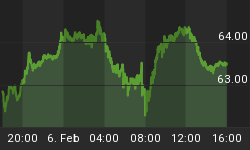We are now importing inflation. This does not only apply to the cost of commodities, such as oil, but also to consumer goods imported from Asia. This is a newer trend as, in our analysis, Asia had been exporting deflation until the summer of 2006; since then, we have seen increased pricing power by Asian exporters.
Inflation is not just a U.S. phenomenon; as Asian economies are far more dependent on agricultural and industrial commodities, rising inflation may become a serious concern in the region. The stronger and more prudent Asian central banks may realize that allowing their currencies to float higher versus the U.S. dollar may be the most effective way to combat inflationary pressures.
| Merk Insights provide the Merk Perspective on currencies, global imbalances, the trade deficit, the socio-economic impact of the U.S. administration's policies and more. Don't miss an Insight: Sign up for our Newsletter The Archive: Read past Merk Insights | |
Available credit is likely to continue to be tight. In a move former Federal Reserve ("Fed") Chairman Paul Volcker referred to as being at "the very edge" of the Fed's legal authority, the Fed engineered a bailout plan to avoid bankruptcy for Bear Stearns, up until recently a major investment bank. It was followed by moves to allow investment banks not regulated by the Fed to swap 'investment grade securities' with Treasury securities. Basically, this allows financial institutions to turn illiquid reserves into liquid ones to survive. However, because the Treasury securities are merely loans against the collateral provided, banks continue to own a lot of securities that - in our assessment - should rather not be used as reserve capital. As a result, banks may be reluctant to extend credit out of fear that their balance sheets continue to be weak. Similarly, banks may continue to be reluctant to extend overnight loans to one another. In our assessment, these emergency measures by the Fed prolong the credit contraction. To get through the credit crisis, we believe regulators should apply far more pressure on financial institutions to find substantially new capital, replacing questionable reserves with good ones. While a lot of progress has been made, the terms of any capital infusions that we have seen suggest to us that a lot more work is ahead for the banks.
This is relevant to the U.S. dollar because the lack of available credit is a negative for economic growth; because of the U.S. current account deficit, the U.S. dollar is particularly vulnerable to an economic slowdown. This is in contrast to Europe, where an economic slowdown may not be a positive for the currency, but because the current account is reasonably balanced within, say, the euro-zone, an economic slowdown need not directly translate into a weaker euro. Add to that the more solid monetary policy by the European Central Bank ("ECB"); ECB president Trichet has said that during times of turbulence, it is imperative that inflationary expectations remain firmly anchored. Just as importantly, his words have been followed by action, namely by not cutting interest rates as a result of the global credit crisis. We have been a vocal critic of interest rate cuts in the U.S. because, in our assessment, they do much more harm than good: subprime borrowers or holders of illiquid debt instruments are shunned from the markets in the current environment because of general risk aversion, not because of the level of interest rates. Lower interest rates, however, may cause inflationary pressures to build further and may cause further downward pressure on the dollar.
In this context, we conclude that it may well be in the Fed's interest to have a weak dollar. This is consistent with what we interpret to be Fed chairman Ben Bernanke's disliking of the gold standard. In his book "Essays on the Great Depression", Bernanke argues that countries that abandoned the gold standard recovered from the Depression more quickly. Similarly, based on our analysis of his academic publications before becoming Fed chairman, we believe that Bernanke may actively work to weaken the U.S. dollar in what he may consider an effort to alleviate hardship on the people. The Fed may be encouraged to pursue a weaker dollar because, in the past, a weaker dollar did not necessarily result in higher inflation. However, this does not mean that actively pursuing a weaker dollar will not cause significantly higher inflation. We are seeing signs that the weaker dollar is taking a heavy toll on inflation as import prices are up about 15% in the 12 months ending March 31, 2008; while high oil prices are contributing to inflationary pressures, prices are higher across goods, services and geographies.
As inflationary pressures increase, the Fed may not be able to tighten monetary policy out of fear that the fragile financial system may be unable to cope with a restrictive monetary policy. Indeed, we believe the Fed seems to encourage inflation to allow financial institutions to repair their balance sheets. In our assessment, the Fed would welcome inflation in the current environment, despite their public pronouncements to the contrary, as long as it was uniform, i.e. if there was also wage inflation.
We manage the Merk Hard and Asian Currency Funds, mutual funds seeking to profit from a potential decline in the dollar by investing in baskets of hard and Asian currencies, respectively. To learn more about the Fund, or to subscribe to our free newsletter, please visit www.merkfund.com.















